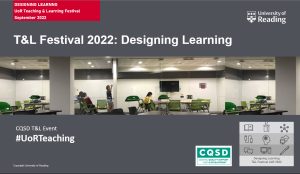
I’ve recently joined the Technology Enhanced Learning team, having spent 4 years working as an Academic Liaison Team Manager in the University Library. This is a really exciting and busy time to join the CQSD team, and the T&L Festival seemed perfectly timed to help consider TEL Support in relation to the next year’s planning and programme redesign. I found the emphasis on simple interventions in collaboration with support services, and the wide range of disciplines contributing to the different initiatives really interesting. It was great to hear some really simple yet effective ways to improve the teaching and learning experience for students and staff, from within the University as well as from speakers at other institutions.
Simple actions, big impact
Although there were some ambitious initiatives presented – such as Lydia Arnold’s example of designing an authentic group work assessment asking students to pitch to industry professionals, or Jo Johnson’s work to create a pollinator meadow on the London Road campus to generate discussion around sustainability – some of the actions taken were simple yet very effective.
For example, working with student Inclusivity Consultants to ensure that Blackboard menus are well-designed and coherent; or that course documents are accessible to all students and screencasts and classroom recordings are captioned. Annie Hughes and Tamara Reid also presented on work that Inclusivity Consultants at Kingston University have carried out to update online reading lists with a range of sources and voices. In his excellent keynote on wellbeing, Gareth Jones discussed the importance of working with support services and signposting students help. This can be particularly helpful when students are approaching assessments, to manage stress and use assessment as a way to develop and utilise their skills. These actions could be simple, but may have a great impact on students’ wellbeing and their learning experience.
Useful links
I’ve linked to some guidance above, but if you’re inspired by the recorded sessions and are interested in working with TEL on your current and future programmes, you might find the following links useful too:
Learning Capture
Creating accessible content with Blackboard Ally
Digital Tools for Assessment
TEL Support and Development for Staff
Summary of sessions attended
Day 1: Education for Sustainable Development
It’s clear that sustainability is a key component of the University Strategy, and I found that Zoe Robinson’s keynote highlighted the relevance of so many areas of sustainable development to T&L at Reading. The University of Reading showcase covered 3 initiatives which encouraged students and community engagement with sustainability:
- Embedded sustainability information in teaching for trainee Primary School teachers in the Institute of Education to empower teachers and pupils
- The Museum of English Rural Life’s Curating Tomorrow exhibition to tell stories and make connections using artifacts and object-led teaching
- The installation of Bee Meadows on the London Road campus to work with local schools and botany experts at the University
Day 2: Wellbeing and Inclusivity
Gareth Jones’s insightful talk covered all areas of student wellbeing, particularly the importance of the curriculum as the guaranteed point of contact for all students. The afternoon’s session from Tamara Reid and Annie Hughes from Kingston University discussed student Inclusion Consultants whose work on inclusivity initiatives within the University included:
- reviewing Blackboard modules for accessibility
- adding diverse resources and voices to online reading lists
- re-evaluating field trips to incorporate a range of experiences.
The afternoon’s showcase introduced the University’s own Inclusivity Consultants, their priorities for improving teaching and learning experience for students, and plans for the future.
Day 3: Authentic Assessment
Lydia Arnold’s definition of authentic assessment as ‘authentic to the individual, the discipline, and the future workplace’ highlighted the ways in which students can be encouraged to find their own path through an assessment. It was great to hear the range of different authentic options which could be used, again on a spectrum from asking students to write a journal article submission rather than a traditional essay, through to presenting a pitch to industry professionals.
The afternoon showcase included examples from 3 Schools:
- Students on a Commercial Law module working through a case study to apply theory to a realistic example in the workplace
- A group work project in Food bringing together students from different specialisms to collaborate on a case study analysis
- Application of market information research to a Real Estate and Planning module, drawing on industry expertise.
